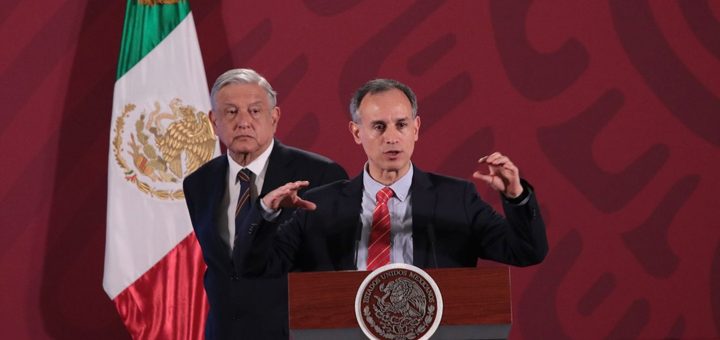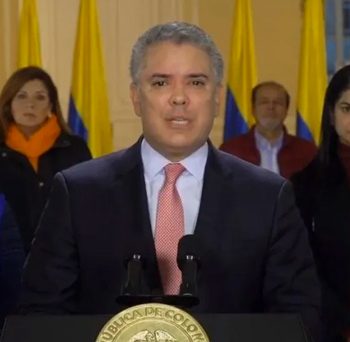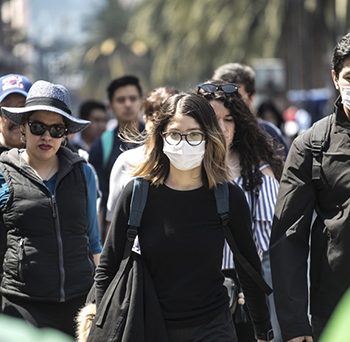
Comunicado COVID-19 México y Centroamérica
- Posted by México
- On Thursday March 26th, 2020
- 0 Comments
Mexico
There are a series of actions taken by the Mexican government most of them contained in the plan “National Program of Healthy Distance” in which the government of Mexico proposed four guiding axes to prevent the spread of the virus in the country between March 23 and April 19:
1.Take basic preventative measures: wash your hands, avoid handshakes and kisses, and stay home if you are sick.
2.Suspend non-essential public-sector, private-sector, and social activities. Employees who can telework should do so. Public transit will remain operational.
3.Organizers of large events with more than 5,000 attendees will reschedule or postpone them.
4.Protect the elderly and vulnerable.
The government has declared Phase 2 in March 24, which implies the temporary closedown of museums, libraries, cinemas, theaters, shopping malls, department stores, recreational parks, zoos, party halls, bars, gyms and sports centers. Also, there has been suspended all work activities that involve the mobilization of people. Local businesses that are not tied to the sale of food and medicine will also close their doors. Restaurants may continue to operate with delivery into the establishment and home delivery.
The authorities stablished that anyone with symptoms of coronavirus have to stay home for 15 days and contact medical assistance specially if they are pregnant women, elderly people or patients with hypertension or diabetes.
These measures have the intention decrease the contagion curve so that there is no community transmission.
Relevant information of migration
Entry and Exit Requirements:
- There are no entry or exit restrictions in place because of COVID-19.
- Mexico has implemented temperature-screening measures at some of its airports. Passengers with abnormal temperatures and travel to high-risk areas might be subject to additional health screening.
- Beyond standard travel documentation, travelers to Mexico do not require any additional documentation to enter or exit.
Schools, Business, Transportation, and Government Closures
- The Ministry of Education has closed all schools from March 20 until April 20.
Ministry of Foreign Affairs
All Mexican Consulates around the world are closed until April 20th.
Quarantine and Healthcare Information:
- There are no mandatory quarantine policies currently in effect in Mexico for confirmed or suspected cases. The Mexican government encourages people experiencing the symptoms of COVID-19, fever, cough, headaches, throat pain, or constant sneezing, to stay at home for 15 days, consult with, and comply with the instructions of your local healthcare provider.
- The Mexican government recommends individuals not self-present to seek testing for COVID-19. Those with severe symptoms should seek medical attention and medical professionals will test, if needed based on travel history, contact with a known case, and the individual’s risk group. Medical professionals will prescribe actions as necessary; including medication to manage symptoms as no specific therapeutics or vaccine exist for COVID-19.
- Travelers who return from a country with local transmission of COVID-19 and develop symptoms of respiratory illness should seek immediate medical attention and share their travel history.
- The same applies to individuals who were in contact with a confirmed case of COVID-19 and present symptoms of respiratory illness.
Local Resources:
- Health advice for travelers seeking information is available at ports of entry.
- Call the Mexican Ministry of Health’s COVID-19 hotline at 800 0044 800 for information or medical attention. English language operators are sometimes, but not always, available or visit this site created by the Mexican government: https://coronavirus.gob.mx/covid-19/
Relevant information for Expats
The expat population in Mexico has a feeling of the community coming together which makes assignees have a calm atmosphere that allows them to proceed with their activities as normal as possible, as long as they follow the hygiene guidelines established by the Mexican government and their companies.
We at SRS are working from home but always attentive to all our clients’ needs and requirements.
Centroamerica
Governments across Central America, a region of some 50 million inhabitants, have over the past week taken increasingly stronger measures to prevent the spread of coronavirus, such as restricting flights, cancelling massive events and suspending classes.
Costa Rica
In Costa Rica, the congress on March 21 gave its first approval to a $500 million line of credit with the Development Bank of Latin America to combat the crisis.
The President, Carlos Alvarado, and the Health Minister, Daniel Salas, ordered the preventive closure of educational centers at risk for at least 14 business days, a 50% reduction in the capacity of public meeting spaces and the suspension of travel abroad for public employees. The health authorities tightened the measures, ordering the closure of bars, casinos, discos, cinemas and theaters, and establishing that the local soccer championship be played behind closed doors. Likewise the Health Ministry has display a daily report monitoring coronavirus infection spread as well as graphics contingency plan and national protocols in there official website available at: https://www.ministeriodesalud.go.cr/index.php/centro-de-prensa/noticias/741-noticias-2020/1532-lineamientos-nacionales-para-la-vigilancia-de-la-infeccion-por-coronavirus-2019-ncov
Relevant information of migration
Entry and Exit Requirements:
On March 16, the Costa Rican government announced that as of 11:59 P.M. on Wednesday, March 18, 2020, and continuing until April 12, only Costa Rican citizens, residents, and foreign diplomats will be able to enter Costa Rica. This restriction applies to land, sea, and air arrivals. Air crews will not be subject to this restriction.
The migration authorities recommend foreigners who are resident in Costa Rica to avoid leaving the country unless they consider it absolutely essential otherwise, they might have to deal with some discomfort emerged by the current restrictions while trying mobilize.
Management of both airports that receive international flights (San Jose and Liberia) have protocols in place in order to deal with suspected COVID-19 cases.
Puerto Caldera, the main commercial port on the Pacific side of Costa Rica, has also established o protocol for suspected COVID-19 cases.
Quarantine Information:
As of March 16, anyone arriving in Costa Rica from another country must self-quarantine for 14 days.
The Ministry of Health has established definitions of risk for COVID-19 infection and guidance for the prevention of the spread of the virus that reflect World Health Organization guidelines.
Beginning March 24, Costa Rica will have a countrywide vehicle restriction between 10 pm and 5 am, with only emergency vehicles, press, and other exceptions allowed on the streets. Fines of 22,000 (national currency) will be imposed on those violating this order.
Local Resources:
COVID-19 crisis page on travel.state.gov
CDC page on COVID-19
Travel.state.gov Country Information and Travel Advisory page
Useful telephone numbers are as follows: in an emergency, dial 911. For COVID-19 related issues the Costa Rican Tourism Institute has provided a non-emergency number: 1322. For tourist advice, including accommodation and travel, call +506-2299-5827 or via WhatsApp messaging at +506-8628-3247.
Expats Highlight
It is highly recommended as a preventive measure to take out travel insurance that covers any eventual health need, it must cover health care in quality hospitals and centers, as well as appropriate medical tests and hospitalization plans, the scope of the insurance contracted must include health repatriation to your country of origin in case you need it.
All foreigners who have legal residency in the country or regular status and who choose to leave the country will automatically lose their migratory status.
Guatemala
Guatemalan President, Alejandro Giammattei, announced on Monday, March 16, that all borders will be closed for 15 days from 00:01 (local time) on Tuesday, March 17, to prevent further spread of coronavirus (COVID-19) in the country. Guatemala is not permitting entry of flights into Guatemalan territory, only Guatemalan citizens and accredited diplomats will be allowed to enter the country by land but will be placed in a seven-day quarantine upon arrival.
The country had already banned the entry of citizens of European countries, Iran, China, North and South Korea, the US and Canada.
A care center for individuals affected by COVID-19 is being set up in the Industrial Park in the capital, Guatemala City. Other containment measures remain in place as of Monday, including the suspension of all public and private school classes until at least March 28. Gatherings of more than 100 people are also prohibited, and football matches must be suspended or played without fans in attendance. Further restrictions may be implemented over the near term.
Public transport is suspended. All sporting, cultural and social events are prohibited. Religious events that require the presence of people are suspended. All malls, pubs and clubs have been ordered to close. Restaurants are allowed to serve delivery orders and drive through options. The sale of alcohol is prohibited from 6pm to 5am. Core businesses, such as banks, petrol stations, pharmacies and supermarkets, are open. All commercial establishments authorized to operate will be closed from 9pm to 4am.
Hospitals, Medical Centers, medical laboratories, veterinaries, drug companies, and companies that produce hygiene products are permitted to stay open. Those companies are allowed to transport their staff with prior authorization from the Ministry of Economy.
A curfew will be in place for the whole country from Sunday 22 March 2020, from 4pm to 4am each day, for a period of 8 days. Everyone should remain indoors while the curfew is in effect, unless you have special permission from the Ministry of Economy to operate during the curfew. Anyone found outdoors without the necessary permission will be fined and may potentially face imprisonment.
Relevant information for Expats
Local authorities have indicated that foreigners are allowed to leave the country by land through the Tecun Uman and El Carmen border crossings to Mexico. There are local bus companies transporting foreigners to these borders, if you are interested in this option, you can contact the bus company direct through their website.
If you wish to extend your visa, you must submit an application to the Guatemalan Institute of Migration in Guatemala City. If you overstay your visa then you should expect to pay a fine before leaving the country. This fine can only be paid at the main Migration office in Guatemala City. Fines can’t be paid at the airport or land borders.
If you are an expat be very careful to have your health insurance updated because hospitals in Guatemala are reluctant to give medical treatment unless they can be satisfied that you have medical insurance. It’s therefore essential that you carry evidence of your insurance cover at all times.
El Salvador
The Government of El Salvador have introduced a number of precautionary measures including banning entry to foreigners. The president, Nayib Bukele, declared a red alert which consists on assigning 2,000 soldiers to guard the blind border points and prohibit the meetings of more than 200 people.
On 21 March the Government imposed a 30 day 24/7 national curfew, with exceptions only for designated essential workers. The president ordered that public and private sector employees, over 60 years of age, pregnant women and people with chronic diseases or immunosuppression should be sent home for a period of 30 days, as it is a sector of the vulnerable population at the spread of the coronavirus. In addition, it ordered the closure of the offices where the Unique Identity Document, DUI, is processed. The DUICENTROS and gyms, along with the bars and discos will be closed for a period of 14 days.
Key services (including supermarkets, pharmacies, banks, petrol stations and take away/home delivery food outlets) will operate, and one individual per household can go out to buy essential supplies. Schools and universities and many other businesses and organizations are closed. During the curfew only one person per family unit will be allowed out to shop. Also exempted from the curfew will be public servants, doctors, road, energy, banks and restaurant workers, as well as journalists, the military, the police and food distributors.
Relevant information for Expats
El Salvador International Airport has suspended passenger flight operations until at least March 31 and will only receive air cargo and humanitarian missions in the meantime. The closure of the airport is the part of a series of restrictions introduced by the Government with little to no advance warning. Only Salvadorans, foreign residents and accredited diplomats are permitted to enter the country, but only under strict conditions
Summary of key points for protection of Expatriates
The priority is to follow above all, the recommendations of the WHO:
- Wash your hands often with soap and water for at least 20 seconds. If soap and water are unavailable, use an alcohol-based hand sanitizer.
- Avoid touching your eyes, nose, and mouth
- Stay away from sick people if possible
- Steer clear of crowded places, especially if you are an expat in Europe
- Consider using a face mask in infected zones – but many experts say the effectiveness of mask is negligible outside a hospital setting
- Stay home when you’re sick & quarantine yourself from your family members – in fact, in many countries authorities are asking people to stay home
- Cover your cough or sneeze with a tissue, then throw the tissue in the trash
- If you find yourself going through any of the symptoms or think you are infected, you should immediately seek medical support to relieve symptoms – but call before you show up a hospital so they can take steps to avoid the spread of the virus. Furthermore, it is also important to include treatment to support vital organ functions. There have been some discussions on whether or not the virus may be infectious even before a person shows symptoms – this seems to be the case.
- If you are an expat and you catch the COVID-19 virus, there is a very good chance you will not be able to be medically evacuated. It is due to the restrictions on flights, quarantine, or restrictions on movement into another country. Make sure you have coverage in place and check that your current travel or health plans cover you.
From the point of view of international mobility, the coronavirus (COVID – 19) has a direct impact on the frequent traveler, as well as on the expatriate community, but as said the fundamental aspects that we must consider are: the health care coverage, the possible evacuation, repatriation, forced immobilization and the possible cancellation of the trip, where it is essential to have this coverage in the policy, before the declaration of an international emergency by the WHO.




0 Comments